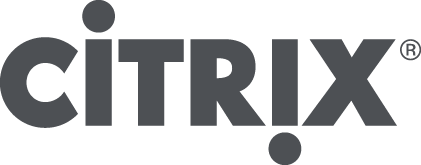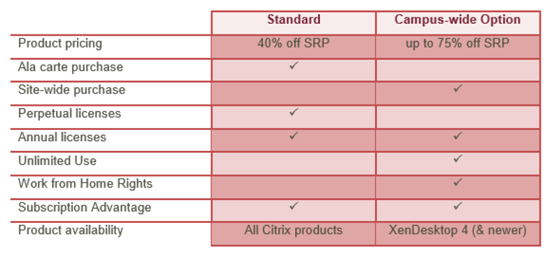Citrix Licensing Quick Guide
 As with all major software vendors, Citrix has a number of different licensing schemes in an effort to cater for different kinds/sizes of organizations as well as the differences between corporations, educational institutions, charities and government bodies.
As with all major software vendors, Citrix has a number of different licensing schemes in an effort to cater for different kinds/sizes of organizations as well as the differences between corporations, educational institutions, charities and government bodies.
Commercial Sector
Here there are 2 offerings which are:
- EASY License Program
- Enterprise License Agreement Program (ELA)
EASY License Program
This is aimed for companies with as few as 5 machines & requires no initial investment, but offers no discount either.
Enterprise License Agreement Program
This follows a similar model to Microsoft agreements in that customers are required to have 250 pcs & the price discount set by the initial order. It “provides all-inclusive discounts for products & select services, and exclusive member offers”. Other benefits include:
- Cross Product Discounts – Cost savings across the breadth of the Citrix portfolio
- Select Service Discount – Discount on the “Citrix Delivery Architecture Assessment”, a process to enable customers to validate readiness prior to a Citrix rollout.
- Citrix Executive Program membership – Customer executives get access to interactive sessions with key Citrix personnel and networking opportunities with both Citrix and other customers.
Education License Program
This is designed to make it simple and affordable for educational establishments to use Citrix technologies, giving a 40% discount on any Citrix product. It requires an initial purchase of at least $20,000.
- XenDesktop Campus Wide Option – Based on a Full Time Equivalent (FTE) student count (that must cover 100% of students in the school/dept. being included), this gives licensed users unlimited, anywhere, any device access. The FTE number must match the count on your Microsoft EES agreement & there is a minimum of 1000 FTE required.
- Work at Home Rights – Use of a home computer for school work is allowed at no extra charge.
Definition of a Full Time Equivalent (FTE) student:
“One (1) full time equivalent (FTE) student is defined as either; one (1) student attending an educational institution on a full time basis, or, three (3) students attending the same educational institution on a part time basis.”

https://www.citrix.com/buy/licensing/programs/enterprise.html
Note: Publicly funded educational institutions in EMEA & Brazil may use the “Government & Government Education License Agreement (GELA) Program instead.
https://www.citrix.com/buy/licensing/programs
Government & Government Education License Agreement (GELA) Program
This program is for Government organizations but as noted above, also applies to government funded education institutes in EMEA & Brazil.
With this you can “apply the same discount you receive for your first qualified purchase to any additional eligible Citrix product. Discounts apply for an initial period of two years, after which they may be renewed annually with an additional qualifying purchase”. It covers all software & hardware products & starts from 5 users.
XenDesktop Licensing
Citrix offer a variety of licensing options in an effort to give customers the choice and flexibility needed in today’s workplace.
Product Editions
- VDI Edition – For delivering virtual desktops only and includes HDX technology, provisioning services, profile management & StorageLink.
- Enterprise Edition – Includes FlexCast delivery technology to deliver “the right type of virtual desktop” to any user, anywhere.
- Platinum Edition – Desktop virtualization solution with advanced management, monitoring & security.
Feature comparison between editions:
The Platinum edition includes a number of unique features including:
- Performance monitoring for hosted apps
- Password management
- SSL VPN
And more. See here for complete feature breakdown.
Licensing Models:
User Licensing – Aimed at dedicated desktop access:
- One User
- Unlimited Devices
- Unlimited connections to virtual desktops & apps
Device Licensing – Aimed at people sharing desktops/devices:
- Unlimited Users
- One Device
- Unlimited connections to virtual desktops & apps
Concurrent Licensing – Aimed at occasional and/or anonymous use:
- Any User
- Any Device
- One connection to a virtual desktop OR unlimited apps
XenApp
Product Editions:
- Fundamentals – Aimed at the small & medium business looking for secure, remote access.
- Advanced – A “solid foundation” for on-demand application delivery
- Enterprise – “Enterprise Class” on-demand application delivery optimized for larger environments
- Platinum – The “most robust, secure & scalable” for delivery applications on-demand.
Licensing Models:
User Licensing – Provides access to named users:
- One User
- One Device
- Unlimited connections to virtual applications
Concurrent Licensing – Licenses are assigned to each connection from a central pool
Feature Comparison between editions:
Fundamentals is the entry level product with features being added as you move up through the product levels to Platinum. Additional features include:
- HDX Rich Graphics
- HDX Smart Access
- Single Sign On (SSO)
- Profile Management
And more. For a full breakdown of the differences, see here.
Licensing Microsoft within a Citrix environment:
The first thing to note is:
“All users/devices accessing the Citrix server need to be covered with a Remote Desktop Services (RDS) CAL”
So ensure you purchase the requisite number of CALs to go along with your Citrix use.
Next up:
“Each machine accessing an application on the Citrix server must have an equivalent copy installed on the local machine.”
For example, if you have Office Pro 2010 on you Citrix server, devices licensed with:
- Office Std 2010
- Office Pro 2007
may NOT access that central server.
Another key point that can make a big difference to software purchase choices, particularly for smaller organizations is this:
“Only Volume License copies of applications may be used in a Citrix (or RDS) environment”,
so no:
- OEM (Original Equipment Manufacturer)
- FPP (Fully Packaged Product)
or even
- Office 365
If Office is to be used in a Citrix/RDS environment, it must be purchased via:
- Open
- Open Value
- Select
- Select Plus
- Enterprise Agreement (EA).
Citrix & RDS environments add an extra layer of complexity to Microsoft licensing and the management of such assets, so it’s important to understand the rules and what you can do to keep control of your software licensing. A key point is this:
“Any device capable of accessing the Citrix/RDS server must be appropriately licensed for the application/s on that server.”
Microsoft’s application licensing is done on a “per-device” basis so things such as Group Policy are not sufficient for restricting access to applications, as they apply at a user – rather than a device – level. So if you “publish” the apps to 10 people via Group Policy, those 10 people could access it from any one of your 300 machines…meaning you’d need 300 device licenses to be compliant.
I have seen confusion around this point a number of times, even within Microsoft so be careful!
Appsense
Appsense have a range of products for securing, enabling and managing virtualized desktop environments but it’s “Application Manager” that interests us most here.
“AppSense Application Manager uses secure kernel level filter drivers and NTFS security policies…A flexible and granular rule set enables the administrator to restrict access to applications by device name or IP address.”
One key thing to consider with any SAM process, when it comes to license management is, “Will Microsoft approve of it?”. Luckily, Appsense DO have the backing of Microsoft:
“Today’s IT organizations are constantly striving to lower the total cost of ownership of their infrastructure while getting the maximum value from their IT investment. With the onset of multiple delivery technologies, efficient software license management is a key component of today’s IT strategy. Microsoft acknowledge AppSense Application Manager as a solution that enterprises could use as part of software asset management to provide device-based license management in a Windows® Terminal Services, virtual desktop or virtualized streamed environment.” Sam Bramwell, Licensing, Anti-Piracy and SAM Audience Marketing Manager, Microsoft Limited
Making this product something that can be a key part of an organization’s SAM methodology.
[Editors Note: See also RES Software and this post from Brian Madden. If you have any other links or recommendations for Citrix please add a comment below. Thanks, Martin]
Can’t find what you’re looking for?
More from ITAM News & Analysis
-
Software Vendor Insights: What do the numbers tell us about the opportunities for ITAM negotiations?
What software vendor insights can be gained from the latest financial results from Amazon, Google, Broadcom, Salesforce, IBM and SAP? An important part of ITAM is paying close attention to the health of the companies we ... -
Flexera is first SAM tool vendor verified for Oracle E-Business Suite applications
Flexera has announced that it has been verified as the first software asset management (SAM) tool vendor for Oracle E-Business Suite applications. Almost anyone with an Oracle estate will be familiar with the company’s License Management ... -
ITAMantics - March 2024
Welcome to the March 2024 edition of ITAMantics, where George, Rich and Ryan discuss the month’s ITAM news. Up for discussion this month are. Listen to the full ITAMantics podcast above or queue it up from ...